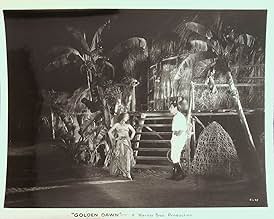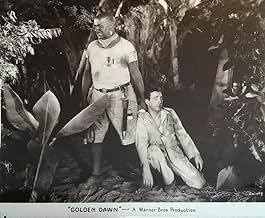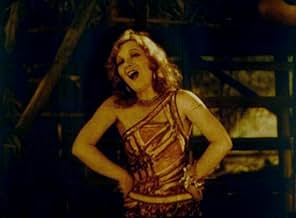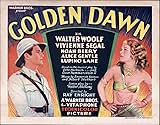Ajouter une intrigue dans votre langue"Golden Dawn" is a musical operetta released by Warner Brothers, photographed entirely in Technicolor, and starring Walter Woolf King and Noah Beery. The film is based on the semi-hit stage ... Tout lire"Golden Dawn" is a musical operetta released by Warner Brothers, photographed entirely in Technicolor, and starring Walter Woolf King and Noah Beery. The film is based on the semi-hit stage musical of the same name by Oscar Hammerstein II and Otto Harbach."Golden Dawn" is a musical operetta released by Warner Brothers, photographed entirely in Technicolor, and starring Walter Woolf King and Noah Beery. The film is based on the semi-hit stage musical of the same name by Oscar Hammerstein II and Otto Harbach.
- Réalisation
- Scénario
- Casting principal
- Tom Allen
- (as Walter Woolf)
- Piper
- (as Sojin)
- Secondary Supporting Role
- (non crédité)
- Hasmali - the Witch Doctor
- (non crédité)
- Napoli
- (non crédité)
- Secondary Supporting Role
- (non crédité)
- Secondary Supporting Role
- (non crédité)
Avis à la une
All that said, it's a rare chance to see the great stage star Vivienne Segal in a lead, and the famous British comic Lupino Lane do a fun eccentric dance. The Kalman score is quite pretty, too, if you can tune out the lyrics. But unless you're a connoisseur of operetta or a lover of grotesquely bad movies, the whole thing is just about unwatchable.
Believe me, I can see why people would give this a low rating. But if you're into saying "Huh?" and wondering what people were thinking when they were creating something...this is for you.
Dawn is a white native goddess with a hazy past, white Britisher Tom Allen loves her purely but jet blacked-up native Shep Keyes lusts after her. It was still clunky old Noah Beery for all the make-up though – I just had to laugh at the blackened armpits of his shirt. He's worth watching singing to his whip too. The first song is shrilled out by a blackface Margaret Dumont lookalike – I looked out in vain for Captain Spaulding. Vivienne Segal and Walter Woolf King (pre-Marx's Lasspari) are excellent in their lead roles with every word and every lyric perfectly enunciated, every emotion delivered complete with Capital Letters. I loved Woolf's line at one point about not letting Segal sacrifice herself and "go through with this savage religious stupidity" – out of the mouths of babes! The songs, even when the lyrics make you sit up are in the main dull as ditchwater except for We Two (I was wishing for Eddie Cantor though) and the energetic A Tiger (the routine later bettered in King Of Jazz's Ragamuffin Romeo).
It's exhilaratingly barmy doing Vienna in the jungle, but it must have played pretty old-fashioned and pointless even in 1930. So if you decide to hunt this down as it's probably banned from TV and watch it, keep it in the strict amber of context and you will have a unique experience no matter what your colour or prejudices. Unfortunately I can't say the same for Blazing Saddles (my personal bête noire) which was not innocent but malicious.
Le saviez-vous
- AnecdotesThe Technicolor version is apparently lost; only the black and white version survives.
- GaffesComposer Herbert Stothart is billed as "Hubert" in the opening credits.
- Bandes originalesAfrica Smiles No More
(1930) (uncredited)
Music by Harry Akst
Lyrics by Grant Clarke
Sung by Alice Gentle
Meilleurs choix
Détails
- Date de sortie
- Pays d’origine
- Langue
- Aussi connu sous le nom de
- Aurora dorada
- Lieux de tournage
- Société de production
- Voir plus de crédits d'entreprise sur IMDbPro
- Durée
- 1h 21min(81 min)
- Couleur
- Color(2-strip Technicolor, original print)



















